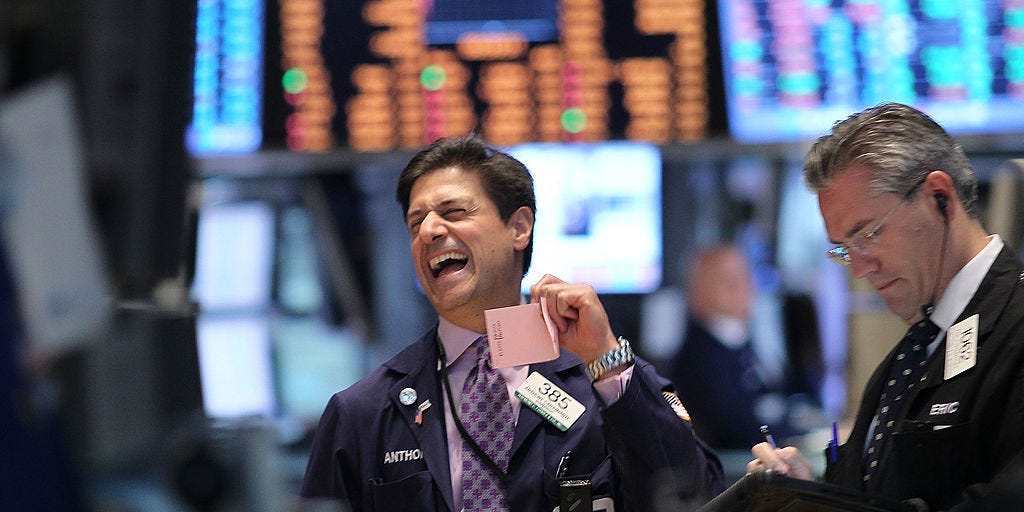
Spencer Platt/Getty Images
- US stocks closed mixed after disappointing labor-market data drove up Treasury yields and fueled valuation concerns.
- The US added 117,000 private payrolls in February, ADP said, well below the 200,000 expected.
- Bitcoin soared above $51,000 to its highest level since its late-February sell-off.
- Sign up here for our daily newsletter, 10 Things Before the Opening Bell.
The value rotation continued on Wednesday as rising Treasury yields cut into bullishness around growth stocks.
Tech giants and other momentum names tumbled after ADP’s monthly employment report showed February job growth missing expectations. The US added 117,000 private payrolls last month, the report said. Economists surveyed by Bloomberg had anticipated a 200,000-payroll gain.
The reading signals that the labor market is returning to growth after a nearly stagnant winter, but the weaker-than-expected data highlights how difficult it will be for the economy to recoup millions of lost jobs.
Treasury yields swung higher soon after the report’s release. The move revived concerns of overstretched stock valuations, leading tech stocks to drive the bulk of the market slump. The 10-year Treasury flirted with a key 1.5% level that it touched last week for the first time in over a year.
Here’s where US indexes stood at the 4 p.m. ET close on Wednesday:
- S&P 500: 3,819.83, down 1.30%
- Dow Jones industrial average: 31,272.44, down 0.38% (119.08 points)
- Nasdaq composite: 12,997.75, down 2.70%
Energy and financial names outperformed through the session. Utilities and consumer-discretionary stocks joined the tech sector in leading indexes' declines.
The broad decline followed weakness in Tuesday's session. Similar valuation concerns dragged on growth stocks, though moves in the Treasury market weren't as pronounced. The Nasdaq composite sank more than its peers, tumbling by 1.7% into the close.
ADP's labor-market data overshadowed optimism about coronavirus vaccine availability in the US. President Joe Biden said on Tuesday afternoon that the US would have enough doses for every American by the end of May, pulling forward a key forecast by two months.
The rate of vaccination has neared 2 million doses per day on average, well above the pace of 1.3 million in the final week of February, according to Bloomberg data.
The House passed the president's $1.9 trillion stimulus proposal on Saturday, and Senate Majority Leader Chuck Schumer has said he plans to bring the bill to the Senate floor by midweek. Biden aims to sign the package into law before expanded unemployment benefits lapse in mid-March.
The package's language isn't finalized. Biden approved a faster phaseout of stimulus-check eligibility after moderate Senate Democrats called on the White House to prevent wealthier Americans from receiving payments. Individuals making more than $80,000 and couples earning more than $160,000 would not get a check under the new proposal.
Democrats are also haggling over the size of a new supplement to unemployment insurance. Moderate members of the party have called to shrink it to $300 per week, while others have asserted that the full $400 is needed to lift struggling Americans. The party needs all 50 votes in the Senate to pass the bill through budget reconciliation, making any last-minute changes risky.
Lyft rose after the company announced that it had its best week for ridership since the start of the pandemic. Wedbush analysts on Tuesday identified Lyft and Uber as top recovery plays.
Oscar Health tumbled after making its public-trading debut. The health-insurance company raised $1.4 billion in its initial public offering at a valuation of $9.5 billion.
Bitcoin hovered above $51,000 after trading as low as $47,118 on Tuesday. The run-up placed the popular cryptocurrency at its highest levels since late February, when it tumbled from record highs.
Spot gold sank 2.1%, to $1,702.04 per ounce, at intraday lows. The US dollar strengthened against Group-of-20 currencies.
Oil prices shot higher amid the Treasury sell-off. West Texas Intermediate crude gained as much as 3.7%, to $61.99 per barrel. Brent crude, oil's international benchmark, jumped 3.2%, to $64.70 per barrel, at intraday highs.
